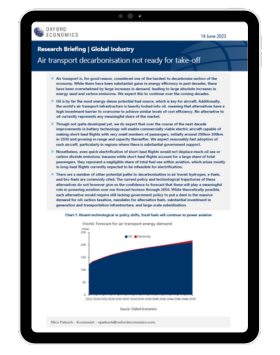Air transport decarbonisation not ready for take-off

Air transport is, for good reason, considered one of the hardest to decarbonise sectors of the economy. While there have been substantial gains in energy efficiency in past decades, these have been overwhelmed by large increases in demand, leading to large absolute increases in energy used and carbon emissions. We expect this to continue over the coming decades.
What you will learn:
- Oil is by far the most energy-dense potential fuel source, which is key for aircraft. Additionally, the world’s air transport infrastructure is heavily locked into oil, meaning that alternatives have a high investment barrier to overcome to achieve similar levels of cost efficiency.
- Though not quite developed yet, we do expect that over the course of the next decade improvements in battery technology will enable commercially viable electric aircraft capable of making short-haul flights with very small numbers of passengers, initially around 200km-300km in 2030 and growing in range and capacity thereafter.
- Nonetheless, even quick electrification of short-haul flights would not displace much oil use or carbon dioxide emissions, because while short-haul flights account for a large share of total passengers, they represent a negligible share of total fuel use within aviation, which arises mostly in long-haul flights currently expected to be infeasible for electrification.
Tags:
Related Services

Service
Global Industry Service
Gain insights into the impact of economic developments on industrial sectors.
Find Out More
Service
Global Travel Service
Detailed travel and tourism market trends and forecasts for 185 countries globally.
Find Out More
Service
Global Industry Model
An integrated model covering 100 sectors across 77 countries and the Eurozone.
Find Out More